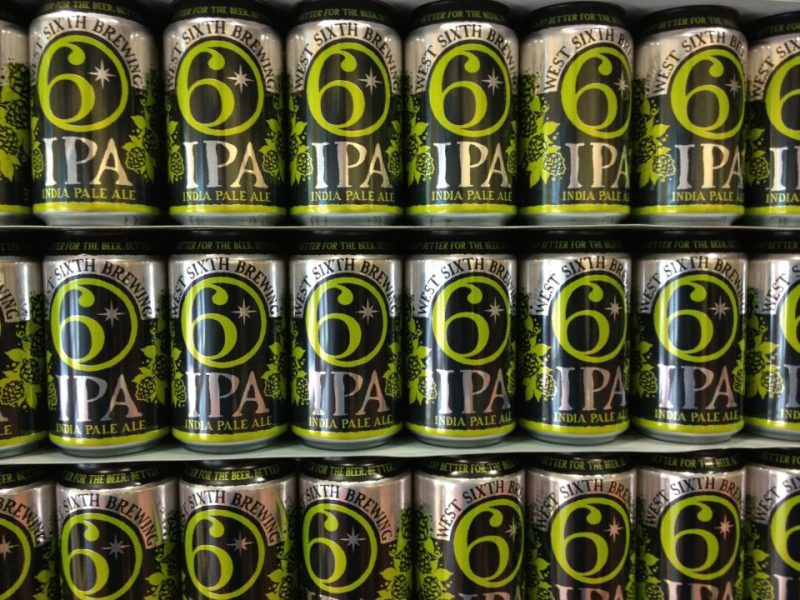We focus our brewing talents on a wide variety of beers, starting when we opened with the West Sixth IPA and now canning 14 beers throughout the year with countless bottles being released. In our taprooms in downtown Lexington (Main Taproom at 501 W. 6th Street and The West Sixth Greenroom at 109 W. Main) and at our Farm, we have 15-20 West Sixth varieties on tap, along with unique small batch bottles from our Sixfold and Barrel Aged series. We are a growing team of over 40 employees, focusing on brewing beers with high quality and creativity that we’re proud to serve to our friends and family, but most importantly: that we like to drink!
Here at West Sixth, we not only like to make good beer but the social impact we are able to make on our communities is a top priority. We support the direct work of non-profits through our Pay it Forward Cocoa Porter, Sixth for a Cause, Wooden Nickel, Pedaling for a Purpose, and sponsoring events we believe in. We are environmentally conscious in everything that we do and we strive to be an awesome place to work. Check out our 2017 Sustainability Report for all the goods!
Current Sustainable Practices
Below are the initiatives West Sixth Brewing has completed on the Green Check scorecard.
Sustainability Management and the Green Team
- Develop a written Comprehensive Sustainability Plan.
- Designate a Sustainability Coordinator or Green Team responsible for managing sustainability initiatives.
- Hold quarterly Green Team meetings.
- Provide time for quarterly updates from Sustainability Coordinator in upper management meetings.
Awareness, Education, and Outreach
- Include sustainability tips in a monthly newsletter.
- Provide a sustainability information board in a common area such as a break room or kitchen.
- Include a sustainability statement and training in all new hire materials.
- Promote sustainability accomplishments in external marketing materials (website, social media, newsletter, press releases, TV/radio ads).
- Provide volunteers for community environmental projects annually.
- Host an environmental event at your location.
- Sponsor an environmental booth at an existing community event.
- Host a Green Check information session.
Energy Efficiency
- Establish a power-down policy and checklist that includes items such as shutting off lights at night.
- Set water heater thermostats to a maximum of 120 degrees or install an inline water heater.
- Apply for energy credits, rebates or incentives.
- Replace incandescent or CFL lights with LED lights 76-100% replacement.
- Upgrade all Exit signs to LED.
- Delamp vending machines.
- Establish a regular filter maintenance policy for your HVAC system.
- Have your HVAC system evaluated every 2 years by a certified service provider.
- Establish a policy for purchasing that requires Energy Star rated appliances and electronics.
- Establish a dress code that encourages employees to dress for thermal comfort.
- Install power strips for computers and equipment to power down during non-business hours.
- Install programmable thermostats and use them to adjust temperature during unoccupied hours.
- Install or upgrade to energy efficient fans.
- Perform external lighting audit.
Waste Reduction and Recycling
- Implement a basic recycling program.
- Conduct a waste audit (within the past two years).
- Provide clearly marked recycling bins at work stations and/or in common areas. Recycling bins must be paired with a waste bin.
- Train and require janitorial service or staff responsible for cleaning to segregate waste and recyclable materials.
- Use reusable mugs and dishware instead of disposable plates, cups, and utensils.
- Establish a policy for environmentally friendly printing such as two sided printing, reusing copy paper, and electronic document sharing.
- Establish an electronic waste policy that diverts all e-waste away from landfill.
- Create a landfill diversion goal.
- Replace at least 50% of paper stock with post-consumer recycled paper.
- Develop or participate in an existing composting program.
- Host, sponsor, or participate in a zero-waste event.
Water Conservation
- Conduct a water audit within the last three years. Monitor and record water usage, check indoor and outdoor pipes and fixtures for drips and leaks.
- Establish a policy for purchase of high efficiency (i.e. WaterSense) rated fixtures and appliances.
Water Quality
- Establish a policy for proper hazardous waste and chemical disposal.
- Establish a policy for proper disposal of fats, oils, and grease, distribute to staff, and post in key areas.
- Harvest rainwater through rain barrel system.
- Perform a stormwater pollution survey on your property with BGGS staff or other qualifies professional.
- Establish a maintenance program for sanitary sewer lateral lines on your property.
- Post information in restrooms about proper disposal of flushable wipes and other items.
- Coordinate or participate in a community litter clean-up.
- Install outdoor ash trays to prevent cigarette litter, and make pocket ash trays available to staff who smoke.
- Before washing parking lots, sweep debris/litter and do not use cleaners.
Urban Forestry and Landscapes
- Establish a native species-only plant replacement policy for tree and shrub planting.
- Remove all invasive species from property.
- Establish an Integrated Pest Management policy to reduce use of pesticides in the landscape.
- Establish environmentally friendly lawn care policies to reduce chemical pesticide and fertilizer use.
- Plant a pollinator garden.
- Plant a rain garden.
- Audit irrigation system for leaks (within the last three years).
- Adjust irrigation system to water during cool periods.
Sustainable Purchasing
- Establish a policy to purchase non-Styrofoam cups and plates for use at the workplace or at events.
- Establish a policy for purchasing locally, if available.
- Establish a policy for purchasing environmentally-friendly cleaning products.
Transportation Efficiency
- Establish an incentives or recognition program to encourage employees to use alternative transportation, such as carpooling, bicycling, or use of public transit.
- Establish and implement a no-idling policy.
- Hold an employee seminar highlighting alternative modes of transportation.
- Conduct a commuter or employee transportation survey.
- Adopt a telecommuting option and make it available to employees.
- Install a bike rack with sufficient space for at least 10% of your employees.
- Install weather-protected bike storage (indoor or outdoor).
- Participate in a bike to work challenge.
- Place bicycle storage closer than any other designated parking spot.
Innovation
- Install a green/living roof.







